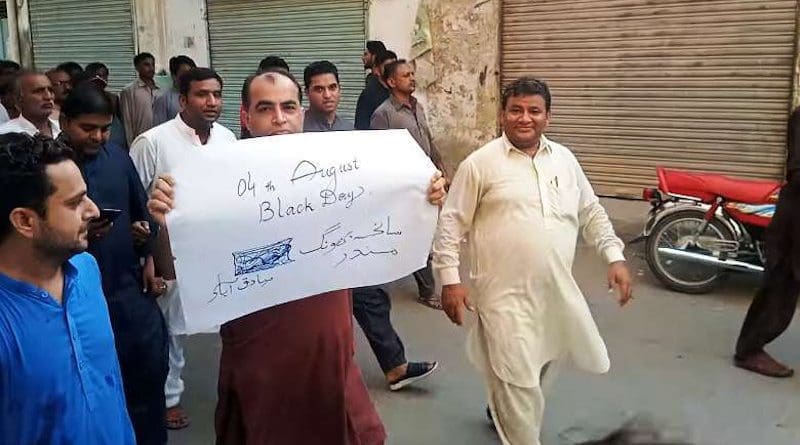Blasphemy: The Curse Of South Asia – Analysis
By Shubham*
South Asia is a rainbow of religious diversity. Afghanistan, Pakistan, Bangladesh and the Maldives have officially embraced Islam as the state religion, a faith followed by over 90 percent of the population. Bhutan and Sri Lanka are overwhelmingly Buddhist. India and Nepal are secular where Hinduism is predominant. Despite this deeply rooted diversity as ancient as the civilization of this land, it is tragic that incidents of blasphemy frequently evoke mob violence in this region.
Afghanistan has had a rich history of Buddhist influence but today Islam is followed by over 99 percent of the population. Hindus, Buddhists and Sikhs number just a few hundred. Despite this majority, Afghanistan imposes the death penalty in accordance with Sharia on anyone considered to act blasphemous against Islam. This is in sharp contrast to how Bamiyan Buddhas were blown by the Taliban but was not considered as an act of blasphemy.
The Pakistan Penal Code imposes stringent punishment including life imprisonment and death for those committing blasphemy against ‘recognized’ religions, Quran and the Prophet respectively. The law is often used to settle personal scores. Minorities including Ahmaddiyas and Shias bear the brunt of this draconian law. Asia Bibi is a Christian woman who was accused of blasphemy by Muslim co-workers in 2010, leading to the death sentence. While Asia somehow saved her life, Minorities Minister Shahbaz Bhatti and Punjab Governor Salmaan Taseer were assassinated for speaking against Asia’s death sentence. A decade later, a Sri Lankan national was burned alive in Sialkot while the proud participants in the vigilante attack live-streamed that barbarism.
India
Secularism has been instilled into the preamble of the Indian Constitution and forms its basic structure. Religious diversity of India brings a lot of tension among religious communities. Section 153(A) of the Indian Penal Code makes blasphemy an offence under hate speech while Section 295(A) directly makes blasphemy an offence with imprisonment of a maximum of three years. Blasphemy in India has caused political gimmicking at best and riots at worst.
Mob violence against those accused of blasphemy has increased as witnessed in numerous lynchings due to allegations of beef consumption or bovine slaughter. This has even led to beef bans in certain states as the cow is a sacred animal for Hindus and Jains. Blasphemy can even lead to communal riots. While this has led to demands for anti-blasphemy laws, there is hardly any political will since blasphemy is an easy political tool to evoke passions that can be used by whoever and whenever.
Bangladesh emerged in 1971 uniting everyone irrespective of religion and ethnicity. But it didn’t take long before Islam was declared the state religion, thereby relegating non-Muslims to the status of second class citizens. Section 295(A) of the Bangladesh Penal Code makes blasphemy an offence. The expulsion of writer-activist Taslima Nasreen over her books signified the march of Bangladesh towards the bigoted path of using blasphemy as a political tool which attained ugly forms leading to multiple riots and attacks on minority as years progressed.
Sri Lanka, Nepal and Bhutan have also seen intermittent violence over allegations of insulting one religion or the other but the problem is not as acute in these countries as it is in the nations discussed above.
Indic faiths
Blasphemy as a concept doesn’t exist in Indic faiths as dharma and karma automatically decide the direction of the individual’s life. While Abrahamic religions view profanity as a strict divergence from duty towards the god, many countries in the West either protect blasphemy under freedom of speech or have abolished blasphemy laws. Despite fierce protests in the Islamic world, France refused to ban the publication of Prophet Mohammed’s cartoons citing its motto of ‘Liberté, Egalité, Fraternité’.
Modern countries have no place for blasphemy being put into their criminal penal codes. Freedom of speech and expression inherently guarantees freedom to question, criticize and raise objections against religions and religious practices. No religion is so fragile that a few words or cartoons threaten its tenets and alter its character. Blasphemy is used as a shield by conservatives against reformists to stop reforms that help make society more egalitarian and enlightened. It is used as a tool to inflame sentiments and incite violence for the self-interests of a few.
A society marred in blasphemy is one that is obsessed with religion. This century is the century of cutting-edge technology and no country can afford to remain entangled in medieval issues like blasphemy and sacrilege. Governments across South Asia need to display stronger political will against violence and unrest over communal and religious issues.
South Asia’s future
South Asia’s rich history and diversity should not become a baggage, but rather an asset. A region that is the poorest after sub-Saharan Africa has a lot of issues to focus upon, blasphemy having the luxury of being ignored. The region can transform itself into a peaceful, prosperous and progressive region where freedom and dignity of every individual is valued and debate and dialogue form the basis of religious discourse and not violence bigotry, fanaticism and violence.
*About the author: The writer, an M.Com degree holder from Hindu College, University of Delhi, keenly follows global geopolitics, international relationships, diplomacy and security studies. Views are personal. He can be contacted at [email protected]
Source: This article was published by South Asia Monitor

